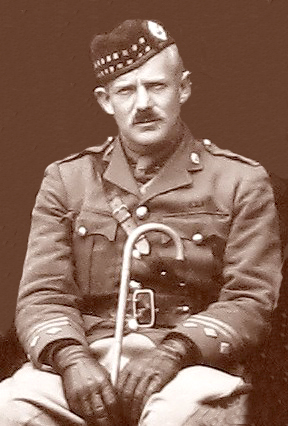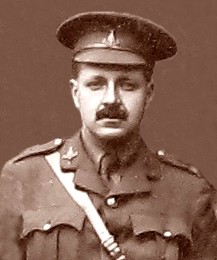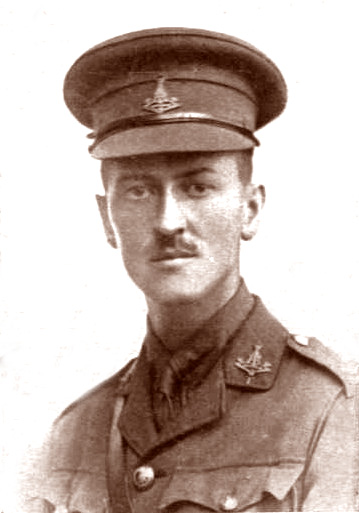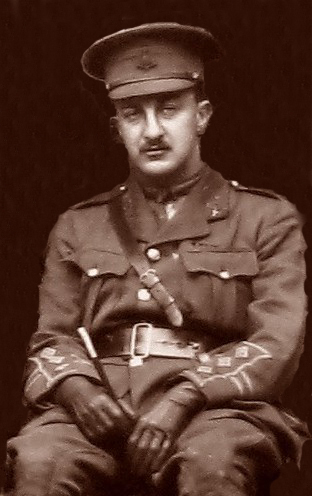
The Ypres Salient April 22nd 1915.
|
On the 25th General Sir H Plumer, commanding II Corps sent a special messenger to thank the 4th Yorks for the
good work that they had done.
The Division History says -
"On through Fortuin the two Battalions went, next encountering the enemy in
force advancing south of St Julien.
They forced the enemy to give ground and drove him back into the village.
They then found themselves up against a muddy stream, known as the Hannebeek, on the southern exists of
St Julien and, the crossings being swept by heavy rifle and machine-gun fire, the two Battalions were forced to
take what cover presented itself.
Casualties during this affair were severe, but the counter-attack was
completely successful and, besides preventing the Germans from making any further advance on the 24th reflected
the greatest credit upon the two gallant Battalions."
The Division Memorial is erected in St Julien in memory of this gallant attack.
In the days action the Battalion lost:-
Major H.C. Matthews. Capt J.V. Nancarrow. Lt L.P. I'Anson and 2nd Lt E Darwin killed.
2nd Lt H.B Blackett wounded.
10 other ranks were killed and 59 wounded.
In very wet conditions, at 8pm, they reached trenches South of the Potijze Chateau. There they had another man killed and
some slightly wounded.
|
Major Scott later sent a letter to the local newspaper describing "the hottest, saddest and most glorious hours of my life."
On the 23rd, we moved up in Support and came under shell fire at 10,000 yards.
The Battalion was halted at the time and without any warning tree shrapnel burse right in the middle of us.
4 or 5 men were hit, but no one was killed. A piece hit me, but just cut my leg very slightly.
As we got nearer, the shells came thicker than ever. About 10 a.m. we took up a position in some rear trenches, under shell fire at the time and stayed there till 4.40, when we were ordered out for a counter-attack.
The regiment got going in Artiller formation and went froward beautifully, laughing at all the shells and Jack Johnsons.
I took my platoon through a farm yard and just as the last man cleared the yard, 2 Jack Johnsons blew the whole place to its and a field dressing station as well.
We went on another 1000 yards and took cover in a ditch, as the shrapnel and machine gun fire were very bad.
One of my men got 2 German snipers 40 yards off, who were laying for me.
We got going again and went forward, the air fairly humming with all kinds of bullets and shells. Men began dropping pretty freely, but the Battallion didn't care, they meant to get in and they did.
Eykin was killed, then Leonard I'Anson, who was trying to get a German sniper; then Nancarrow and then Darwin and Matthews.
Tugwell and Blackett were wounded.
The German snipers are splendid shots and get in most awkward places. We were shooting them down from trees and all kinds of places.
Their Jack Johnsons are wonderful. I have seen a hole 40 feet across and 18 feet deep made by one shell. I fell in one filled with water and was wet through. They aren't nice.
That night and next day we occupied a line of advanced trenches and were very heavily shelled. I was in a trench with my platoon and 2 shells burst right on the back and blew the whole show in.
It was a miracle no was killed. We had to rebuild the whole thing. We have had many narrow shaves, but that is the nearest.
We are all very well and cheerful and the men are grand. They are simply splendid. The Battalion has already been praised for its work.
People at home have no idea of what is going on here - the utter desolation and ruin and the appalling sights.
If some of the fellows who strike at home could see what their pals are going through here, they would make ammunition for nothing.
We are taking part in the biggest fight of the War, but don't worry.
|

Germans at the village of Fortuin.
|

Potijze Chateau.
The area to which the Bn withdrew after holding the Germans at St Julien.
|

Captain G. D. P. Eykyn.
|

Captain G. D. P. Eykyn.
|
Captain Gilbert, Davidson, Pitt Eykyn. Killed in action. Age 34.
Captain Eykyn was attached to the 4th Btn from the Royal Scots.
He was born in Bombay, India, on 22nd April 1881,
the only son of the Late Reverend Pitt Eykyn and Mrs Eykyn, of 82 Prince of Wales Mansions, Battersea Park,London.
He was married on 28th November 1902 to Emily Constance and they had one son, Duncan Arthur, who was born on 11th August 1906.
They lived at "The Cottage" Northallerton, though after the War his wife and son moved to Fir Lodge, in South Parade,
Northallerton.
He was a professional soldier, having served first of all with the 3rd Loyal North Lancashire Regiment with whom he
obtained his commission in 1899. He then joined the 4th Manchester Battalion in 1901.
He served with the Manchesters during the Boer War where he was awarded the Queens Medal with 3 clasps ; "Cape Colony",
"Wittenbergen", and "Transvaal".
In 1904 he joined the Royal Scots and on 13th February 1913 he was appointed as adjutant of 4th Yorkshire Regiment in
Northallerton, shortly after which he was
|
promoted to the rank of Captain on 26th June 1913.
He was a gifted linguist and had passed Army examinations in French, Russian and Hindustanti.
Colonel Bell wrote later to Constance Eykyn:-
“Remember this, your husband trained the battalion and General Plumer has personally thanked us for our behaviour at a critical point,
his is the credit”.
Corporal Wearmouth wrote:-
“It is only natural we looked up to our Adjutant, he was responsible for our training and he having been through the South African
campaign we followed him.”
The Green Howards Gazette in May 1915 said:-
“The splendid work he did as Adjutant has borne fruit in the gallantry displayed by the battalion in action and the death of this fine
Officer is deplored by all.”
|

|

|
2Lt Erasmus Darwin. Age 33. Killed in action. Commemorated on the Menin Gate Memorial. The only son of Horace Darwin. F.R.S. who
was the Chairman of the Cambridge Scientific Instrument Co. His mother, Emma Cecilia, was the only daughter of Thomas Henry, 1st Lord
Farrer. He was the Grandson of the famous Charles Darwin. Born 7 Dec 1881 and educated at Horris Hill and Marlborough where he gained an
Exhibition for Mathematics to Trinity College, Cambridge. On leaving Cambridge he went through the shops at Messrs Mather and Platts at
Manchester. After this he worked for some little while with the Cambridge Scientific Instrument Co of which he was a Director. He then
became assistant secretary at Bolckow and Vaughan and Co Ltd,Iron and Steel, Middlesbrough. Here he stayed for seven years and at the
outbreak of the War occupied the position of Secretary to the Company. He lived during this time at Saltburn by Sea, N Yorks. As soon as
War broke out he joined the Army and was gazetted on 12 September 1914 as an Officer in the 4th Yorks Battn.
|
He was killed in the advance to Fortuin.
Darwin family letters say:-
"The Royal Irish Fusiliers recovered his body along with that of Captain Nancarrow and the
two were buried together with a little cross over it by a farmhouse near St Julien." However this grave must have been destroyed in
the years of subsequent fighting and he has no known grave and is commemorated on the Menin Gate Memorial.
Commanding Officer, Colonel Bell wrote of him:-
"Loyalty, courage and devotion to duty, he had them all.....He died in an attack which gained many compliments to the Battn. He was right
in front. It was a man's death."
Cpl Wearmouth, who was in his platoon, wrote:-
"I am a section leader in his platoon and when we got the order to advance he proved himself a hero. He nursed us
men; in fact his comment
'You would say we were on a field day'. We had got to within twenty yards of our halting place when he turned to our Platoon to say
something.
As he turned he fell and I am sure he never spoke. As soon as I could I went to him but he was beyond human aid. Our Platoon
sadly miss him as he could not do enough for us and we are all extremely sorry for you in your great loss."
Private Wood wrote to a friend in Middlesbrough:-
"I expect you would know poor Mr Darwin....I was in his platoon and I can tell you he died a hero. He led us absolutely regardless of the
bullets from the German Maxim guns and snipers that whistled all round him".
Just before he left England, he was summoned to the War Office and offered a Staff appointment at home in connection with munitions of
War, which work would have given great scope to his capabilities. "It would have been interesting and important work" he wrote, "but,
of course, there are plenty of older men who can do it just as well as I can." Someone present at his interview said that he made a
fine appeal to be allowed to go with his men. The Times of 30 April 1915 said of him:-
|

Lt Leonard Percy I'Anson.
Killed in action on the 24th April 1915.
[For a local Newspaper report of these times - Click here.]
|
Erasmus Darwin would, if he had lived, have added fresh distinction to the name of his family in a walk of life in which it has never
before figured. Between Cambridge and a great Iron works in the North there is something of a gulf fixed and one who knew Darwin only
in his Cambridge home, cannot say anything more than that all those who met him in business conceived a very high opinion of his grasp
of his subject, his acuteness and administrative ability.
It was, indeed, impossible to know him without realising that he combined with
intellectual ability a calm, sound and practical judgment and a general capacity for doing things well and thoroughly. He had too what
must have been invaluable to him in his work, a most genuine sympathy with and affection for working men and this quality which amongst
so many other things had made him love his work at Middlesbrough, gave him intense pleasure when soldiering came to him as a wholly new
and unlooked for experience. He delighted in the men and especially in long expeditions across the moors with his scouts. There is
one more quality as to which all his friends would agree, namely, a conscientiousness that was eminently sane and wide-minded and
completely unswerving. No one in the World was more certain to do what he believed to be right."
Lt Leonard Percy I'Anson. Killed in action. Aged 37.
Youngest son of Mr William and Mrs W I'Anson of Bardencroft, Saltburn, N Yorks. He was born at Saltburn by Sea, N Yorks in 1878 and
educated at Bootham School, York from 1893 to 95, where he excelled at Football.
He qualified as a Solicitor and had his own offices in Middlesbrough.
He was gazetted in Feb 1913 as 2nd Lt and from that year he had been Commanding Officer of the Skelton "G" Company of the 4th Yorks
Battalion Territorial Force.
He was engaged to Elsie, the sister of the three Constantine brothers, who were all Officers in the 4th Battalion.
He is commemorated on the Menin Gate Memorial.
|

Captain John Vivian Nancarrow.
|

Major Harold Carey
Mathews.
|
Capt John Vivian Nancarrow. Age 29. Killed in action. Eldest son of George Bennett Nancarrow and Charlotte Alice
Nancarrow, of "Ravenscroft," Grove Hill, Middlesbrough. He was born in Middlesbrough, N Yorks on the 6th June 1885 and educated at Leys
School and Kings College, Cambridge [M.A. and LL.B.]. Admitted a Solicitor in 1909 and became Secretary to Middlesbrough Chamber of
Commerce. He joined the 1st Vol Bn of the Durham Light Infantry in 1907 and was later attached to the Northumberland Fusiliers at Newcastle
and then to the Duke of Cornwall's Light Infantry [In 1911 he is recorded as a Solicitor, boarding at 19 Basset St, Camborne, Cornwall] before settling in Middlesbrough, where he bacame a Lieut in the 4th Yorks. He was took
a very active part in the Boy Scouts movement in connection with the settlement in Newport Rd, Middlesbrough. After a
school of instruction he was promoted to Captain in the latter part of 1913. During the day of the 24th April in the attack at Fortuin he
was seen cheering on his men and in the advance he stopped to bind up the wound of a Private who had fallen and then hurried forward. After
making several rushes at the head of his men towards the enemy's position, he was shot and died almost instantaneously. His Colonel wrote
of him that "he behaved like a hero". He was engaged to be married to Miss Elsie Harkess of Stokesley, N Yorks.
Commemorated on the Menin Gate Memorial.
Major Harold Carey Matthews. Age 36. Killed in action.
Eldest son of F. W. W. Matthews, J.P of Low Hall,
Sinnington, N Yorks.
|
husband of Marjory Forster Woodhouse (formerly Matthews), of 23, Inverleith Place, Edinburgh.
Harold Matthews was born at Hawes in Wensleydale on April 25th 1879. He was educated at The School in Aysgarth and fought during the
Boer War. He had been awarded King George's Coronation Medal.
Retiring from the military he worked for Barclays Bank and was under manager at the Market Weighton branch when the Great
War started. He immediately volunteered and was gazetted as a major on August 29th 1914.
His CO wrote later:- “He was killed leading his men in his work which earned the compliments of the general”.
Buried in Sanctuary Wood Cemetery.
|
 | 
|
The Menin Gate Memorial.
It contains the names of 54,896 officers and men of the British and Commonwealth forces
who fell in the Ypres Salient before 16 August 1917.
77 of these are men of the 1/4th Battalion, The Yorkshire Regt.
They have no known grave either because they were missing in action or more usually that they had been properly buried
and their graves subsequently destroyed by shelling.
|

Pte Sam Bone.
|
The following soldiers gave their lives at this time.
They have no known grave and are commemorated on the Menin Gate
Memorial.
Some of these would have been given a proper burial with a wooden cross, but in the continuous fighting of the next three years,
over the same ground, their graves were destroyed.:-
2785 Pte Renals George Henry. Home at Middlesbrough, N Yorks. Born at Newport. Monmouthshire.
Enlisted at Northallerton, N Yorks. Killed in action. Age 22.
1649 Pte Bone Samuel. Home at - 2 Kent St, Middlesbrough, town of birth and enlistment. Killed in action.
Age 19.
|

Cpl John Caton.
|
788 Cpl Caton John Thomas. Home at - Garden House, Stokesley N Yorks, place of birth and enlistment. Killed in action.
Age 30. His Battalion number indicates that he had enlisted in his local TF unit some years before the War started. He was married to
Hannah Eliza Caton and left 3 young children only one of which was still surviving in 1926.
2388 Pte Devlin Patrick. Home at Port Clarence, Middlesbrough, town of enlistment. Killed in action.
1321 Pte Dodsworth Henry. Home at - 21 Railway Tce, Sowerby, Thirsk, N Yorks, place of birth and enlistment.
Killed in action. Age 20.
1063 Pte Doughty David. Reported missing and presumed killed in action. Home at Eaglescliffe village Durham. Born 26th February 1888, the son of Christopher and Thomasine Doughty,
of 2, Rose Terrace, Egglescliffe Village, County Durham. Worked as bricklayer in the family building business built up by their father.
His brother Robert was killed on the 20th September 1917 with the 9th Yorks in the 3rd Battle of Ypres.
|

Pte Charles W Miller.
|
1724 Pte Flintoff Charles. Home at - 43 Tennyson St, Gateshead on Tyne. Born Newcastle on Tyne and
enlisted at Middlesbrough, N Yorks. Killed in action. Age 19.
1519 Pte Goldsborough Ralph. Born and enlisted at Bedale N Yorks. Killed in action.
1244 Pte Hubbert Arthur. Home at - Eaglescliffe Durham, place of birth. Enlisted at Yarm, N Yorks. Killed in action.
6 Sgt Kinchin Harry. Home at - 11 Castle Hill, Richmond N Yorks, place of birth and enlistment. Killed in action.
Age 34.
1490 Pte Miller Charles William. Born and enlisted at Middlesbrough, N Yorks. Killed in action.
2039 Pte Wright Charles Enlisted at Guisborough. N Yorks. Killed in action.
Buried at Boulogne Eastern Cemetery.
|

CQMS F A Barr.
|
100 CQMS Barr Frederick Arthur. Home at Newby, Nunthorpe, Yorks. Born and enlisted at Stokesley. Died of wounds.
Age 43.
He had served in the Boer War as 7290 Cpl Barr of the 1st Volunteer Company of the Yorkshire Regiment, enlisting at the age of 26
at Richmond in the year 1900. His trade then was Blacksmith.
He was awarded campaign clasps for Johannesburg, Diamond Hill, Belfast, Cape Colony and the Orange Free State and reportedly the
Queen's Medal.
In the Stokesley Book of Remembrance, kept in the Parish Church, his occupation prior to the First War is given as Innkeeper and also a dancing master, a member of Stokesley Volunteer Band and a long-serving vice-captain of the Stokesley cricket team.
One of his brothers was also killed in the First War and another served and survived.
|

L/Sgt Joseph Taylor.
|
202 L/Sgt Taylor Joseph. Of Quaker Lane, Northallerton, N Yorks, place of birth and enlistment.
Killed in action. Age 28.
Joseph worked as a lengthman on the North Eastern Railway.
He had served with the volunteers before the formation of the Territorial Force and had a total of 11 years
service when he was killed.
Joe left a wife, Sarah and they lived at Long Lane Gates, Brompton, N Yorks.
Captain Stead wrote to his family:-
"Sergeant Taylor, along with his Company Commander, Major Matthews, were the first of their Battalion to fall for
their Country.
His rapid promotion shows the confidence that was placed in him.
He was an excellent soldier and a
brave man."
[Photo and information courtesy of - Northallerton Memorials
Project.]
|
The book "Service of Solicitors and Articled Clerks 1914-18" states that Capt Basil Jackson was wounded at this time.
[He had been a Solicitor since 1905 and had his own firm in Middlesbrough, Jackson and Monk. He had been a Captain with the Battalion before
the War and went on to achieve high rank. He was promoted to Major in this month and was a Staff Captain to August 1916 when he became
Brigade-Major of the 142nd Infantry Brigade to Jan 1917.
From Jan to Dec 1917 he was attached to the British Mission to the Portuguese
Expeditionary Force when he became G.S.O. of VII Corps to the end of the War. He was awarded the D.S.O. T.D. and the Ancient Order of Aviz
of Portugal.]
|

Men of the Yorkshire Regiment, believed to be the 4th Battalion.
|
|



